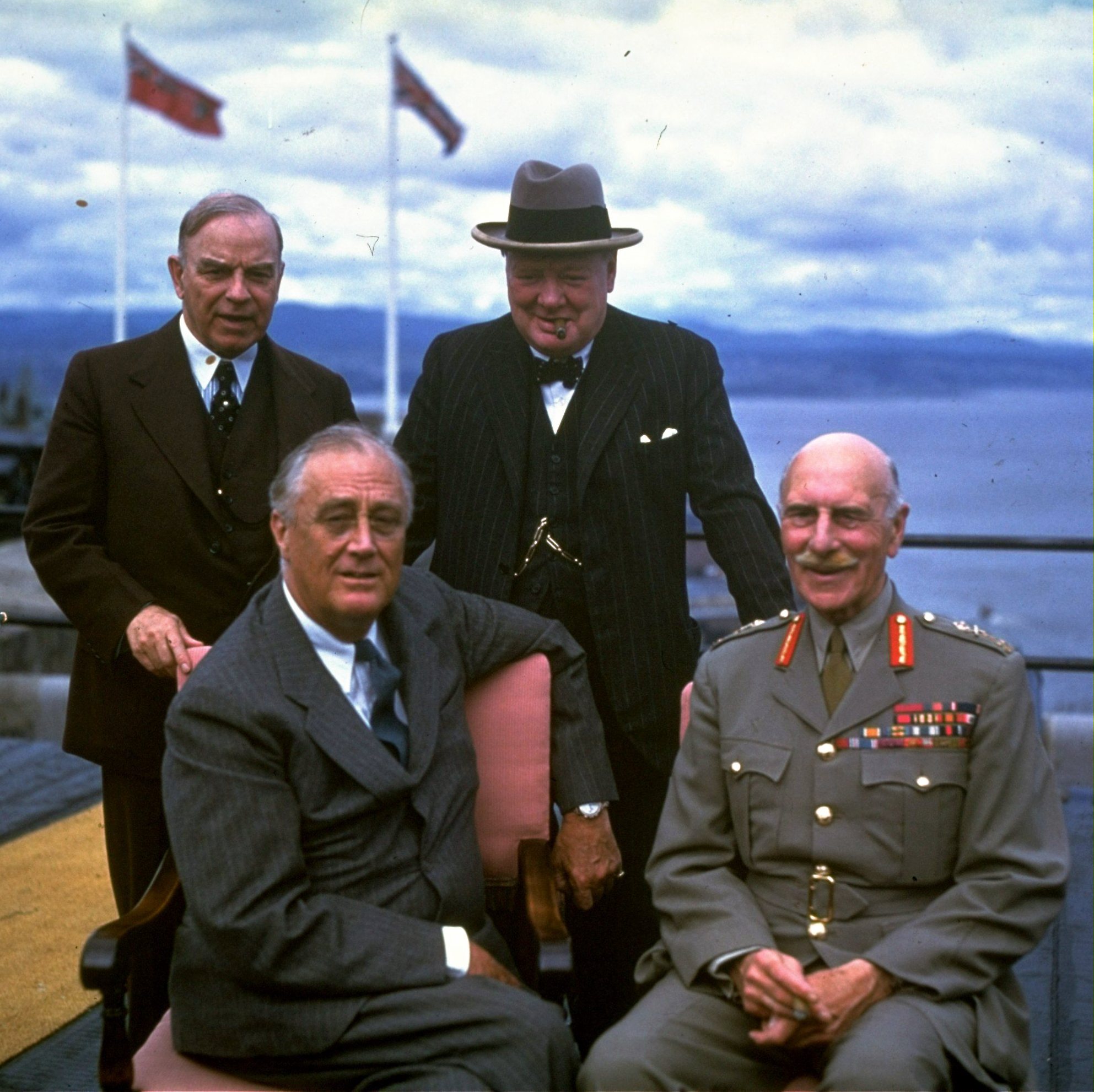Invasion plan all prepared, Québec hears
Commander-in-Chief also believed chosen for European push
By Merriman Smith, United Press staff writer
Fate of Europe may be decided at the Allied conferences in Québec at which these men are some of the leading figures. At the top are Canadian Prime Minister W. L. Mackenzie King and British Prime Minister Winston Churchill; below, President Roosevelt and the Earl of Athlone, Governor General of Canada.
Québec, Canada –
Military decisions for the early invasion of Western Europe have been completed, including the naming of the Allied general who will direct the decisive campaign, it appeared today as President Roosevelt and Prime Minister Winston Churchill took up related political strategy.
The name of the Allied commander for the moment is a closely guarded secret, but Mr. Churchill is known to favor Gen. Harold Alexander, at present chief of land operations under Gen. Dwight D. Eisenhower in the Mediterranean Theater. Gen. Eisenhower would also be a contender but, in the event of a simultaneous smash from the south, his services would probably be required there.
May pick ‘dark horse’
There has been some speculation here that a “dark horse” or relatively unknown military man might get the important post, such as Maj. Gen. Alexander Gatehouse, commander of armored forces at El Alamein.
The Allies must also name a commander for the East Asia Theater, which was created by separation from the India Command. Gen. Sir Claude Auchinleck succeeded Field Marshal Viscount Wavell as commander-in-chief in India when the latter was appointed Viceroy. It was believed that the East Asia Command would go to an American.
Eden in Québec
Anthony Eden, Britain’s Foreign Secretary, arrived here yesterday.
U.S. Secretary of State Cordell Hull said in Washington that he expects to leave late today for Québec. He will be accompanied by James C. Dunn, State Department political advisor on European affairs.
It was apparent Messrs. Roosevelt and Churchill are dealing with the highest phases of both the military and political campaigns when it was revealed they had no scheduled callers at the historic Citadel where they are living in complete informality under one roof.
It was apparent to observers here that, as the political questions are taken up, the Soviet Union more and more became an integral part of the picture. While it was certain that precise boundaries will not be discussed in the absence of the governments-in-exile or without prior consultation with China and the Soviet Union, the territorial demands of all must undoubtedly be foreseen and appraised.
The Russians have for centuries desired an opening on the warm waters of the Pacific and on the Mediterranean. China, too, undoubtedly will have some claim on certain territories, such as Hong Kong and Formosa.
A further element in the political picture was the planning necessary to maintain the hopes of the conquered peoples of Western Europe who have become increasingly restless and impatient at the tardiness of the Allies in rescuing them from their Nazi conquerors.
Seeks diversion of foe
Important in connection with future political relationships was Russian dissatisfaction with Allied failure to divert in any large number of German forces on the Eastern Front. Russia’s desires have called for the removal of at least 60 German divisions of the more than 200 ranged against her.
From Algiers came reports of intensive massing and regrouping of the Allied armies in the Mediterranean area which, it was predicted, would permit speedier execution of the plans Messrs. Roosevelt and Churchill were drawing. In that connection, it was to be remembered that the United States, as well as the other Allies, have had several months to transport men and equipment while the North African and Sicilian campaigns were being pushed.
Keep Axis guessing
For that reason, it may well be that final plans already prepared by the chiefs of staff will not cause any substantial regrouping or rearrangement of men and material and shipping.
Meanwhile, Messrs. Roosevelt and Churchill were losing no opportunity to keep the Axis guessing about where and when the next great blow will be struck.
Decisions of the greatest importance were being made in the heavily-protected Citadel. And the principals were only too happy to see the Axis squirming in uninformed discomfort over what activation of the plans being made here will mean to the German and Jap armies and conquests.
Invasion expected
Some tangible information on the conferences will be made available today by White House Press Secretary Stephen T. Early after he confers with Brendan Bracken, head of the British Ministry of Information.
This much was certain: The decisions of the Québec conferences will be manifest only on the battlefields on the world, probably soon. It was generally accepted here that these manifestations would be a full-scale invasion of Europe.
Meanwhile, there were widely circulated reports that Mr. Churchill or Mr. Eden, or both, would go to Moscow at the conclusion of the conference to tell Premier Joseph Stalin about the decisions.
